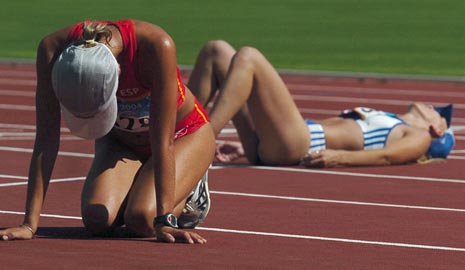In any sport or organisation, you want your athletes and players to work hard to be at their peak of physical fitness. However it can be all too easy to cross the line between this perfect condition, and a state of overtraining. This can impact both the performance of a player in the short-run, and if extended over a long period of time can have serious implications on their career. So if you spot any of the 5 signs that an athlete is overtraining, be sure to take action fast.
1. Weight Loss
If your player is losing pounds that aren’t part of their fitness regime, then this could be cause for concern. Especially if they have been following a diet that should sustain their training programme. Be sure to keep a close eye on athletes that are unintentionally losing weight – it could be sign that they need a break.
2. Lack of Motivation
Struggling to get your players to put in the effort that you normally expect? Sportsmen and women very rarely have lazy personalities, so if they seem unwilling to work as hard as you want them to, don’t be too quick to dismiss a lack of motivation. It could be a sign of fatigue and an inability to recover at their normal rate between training and events.

3. Abnormal Behaviour
Some players are more quick-tempered than others, whilst some are known for their sociability – or lack of it. However if any of your athletes seem to be displaying a different or exaggerated personality to the one that you’re accustomed to, this could be because they are tired and stressed.
4. Illness
Exercise is great for strengthening the immune system. However if our bodies are overworked, we become much more vulnerable to illness. So if one of your players is fighting off a mid-summer cold or a sore throat, it could be a sign that they are run down. Which means giving them a day off from training might not be such a bad idea, even if it is ‘just a cold’.
5. Muscle Fatigue & Injury
If any of your players are complaining about sore muscles or injuries, they should be as in tune to the fact that this is a sign of overtraining as you. Not giving the body proper time to rest and recover can cause serious strain to the muscles and ligaments. So if their legs still ache days after a big match or training session, they might be suffering the consequences from a period of over-exertion.
Overtraining is a common problem is sports, especially team games where the coaches and trainers have to manage the performance and fitness of many members. To this end, using sports analysis software can help you to communicate with your athletes and manage their training effectively. By doing so, you can keep each individual at the level that is perfectly right for them, and ultimately your interests as an organisation.
This article is written by Kelly Gilmour Grassam, a freelance copywriter from Yorkshire. You can follow her on Twitter at @KellygGrassam. This article has been written with helpful information from The Sports Office.



